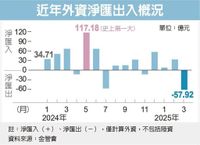On April 7, 2025, the Financial Supervisory Commission (FSC) revealed alarming statistics regarding foreign capital outflows from Taiwan. In March alone, foreign investments remitted out a staggering US$57.92 billion, which translates to approximately NT$1,922 billion when calculated at the end-of-March exchange rate of NT$33.182 against the US dollar. This figure marks the largest outflow recorded in nearly three years, leading to a total foreign capital outflow of US$17 billion for the first quarter of 2025. Such significant movement indicates that Taiwan's stock market is currently facing unprecedented capital withdrawal pressures, the highest since the COVID-19 pandemic began.
The FSC's data indicates that foreign investors sold over NT$604.55 billion in listed stocks within March. This massive sell-off not only reflects a strategic retreat ahead of the impending tariff crisis declared by former President Donald Trump on April 2, but it also sets a new record for the largest monthly net selling in Taiwan's history. The ramifications of these trends are profound, as they impact local brokerage firms and financial evaluations across the industry.
As of the end of March 2025, the total accumulated foreign capital balance plummeted to US$2,815.6 billion, or about NT$9.34 trillion. The FSC noted that the recent outflows have raised concerns about whether this balance could maintain stability amid the ongoing tariff crisis. Market analysts have warned that April could see further record-breaking outflows as the effects of Trump's tariff policies continue to ripple through the economy.
Market sentiment has turned decidedly negative as fears of a prolonged trade war escalate. The FSC noted that the panic surrounding Trump's tariffs has driven capital away from the stock market, pushing investors toward safer investments like bonds or cash reserves. As a result, Taiwanese stocks have reacted poorly, with predictions of continued declines in the near future. The FSC stated, "Given the complex and volatile nature of international trade and tariff issues, we will monitor the situation closely and implement measures as necessary to maintain market stability and protect investor interests."
In March, Taiwan's stock market experienced a historic drop, losing 2,357.28 points, which represents the largest point decline on record, equating to a 10.22% decrease. This drastic downturn underscores the severe impact of external economic pressures and investor sentiment. The FSC's interventions, including the announcement of strict short-selling restrictions just before the market opened on April 7, were aimed at curbing the downward spiral. However, these measures fell short as the market opened with a dramatic plunge of over 2,000 points, breaking through the 20,000-point threshold and setting new records for intraday declines.
Historically, March has often seen net outflows of foreign capital. In 2020, the outflow was approximately US$10.4 billion, and similar trends continued in 2021 and 2022. Conversely, in March 2023 and 2024, Taiwan experienced net inflows, bolstered by factors like the booming AI sector, which attracted US$66.62 billion in foreign capital last year. This year, however, foreign investors began withdrawing funds quietly before Trump's tariff announcement, signaling a shift in market confidence.
The FSC's recent data indicates that the net foreign capital outflow for the first quarter of 2025 has now reached US$16.98 billion, approximately NT$563 billion. This marks a significant turnaround from the previous months, where inflows had been recorded. The statistics reveal that while foreign investors net sold NT$604.927 billion in listed stocks, they also bought NT$15.241 billion in over-the-counter (OTC) stocks, leading to an overall net selling of NT$589.686 billion.
As the global economic landscape continues to shift, the implications of Trump's tariff war are becoming increasingly evident. The market is now rife with uncertainty, as investors remain cautious about potential retaliatory measures from other countries and the outcomes of ongoing negotiations. The FSC has emphasized the necessity of vigilance in these turbulent times, promising to adapt policies as the situation evolves.
While the FSC's efforts to stabilize the market are commendable, the immediate future remains uncertain. Investors are left grappling with the fallout from the tariff crisis, and the potential for further capital outflows looms large. Observers will be keenly watching how these developments unfold in the coming weeks, particularly as April progresses and the full impact of the tariff war becomes clearer.
In summary, Taiwan's financial markets are currently navigating through a storm of foreign capital outflows, driven by external economic pressures and heightened market fears. The FSC's proactive measures aim to mitigate the impact, but the underlying challenges remain significant, necessitating careful monitoring and strategic responses.






